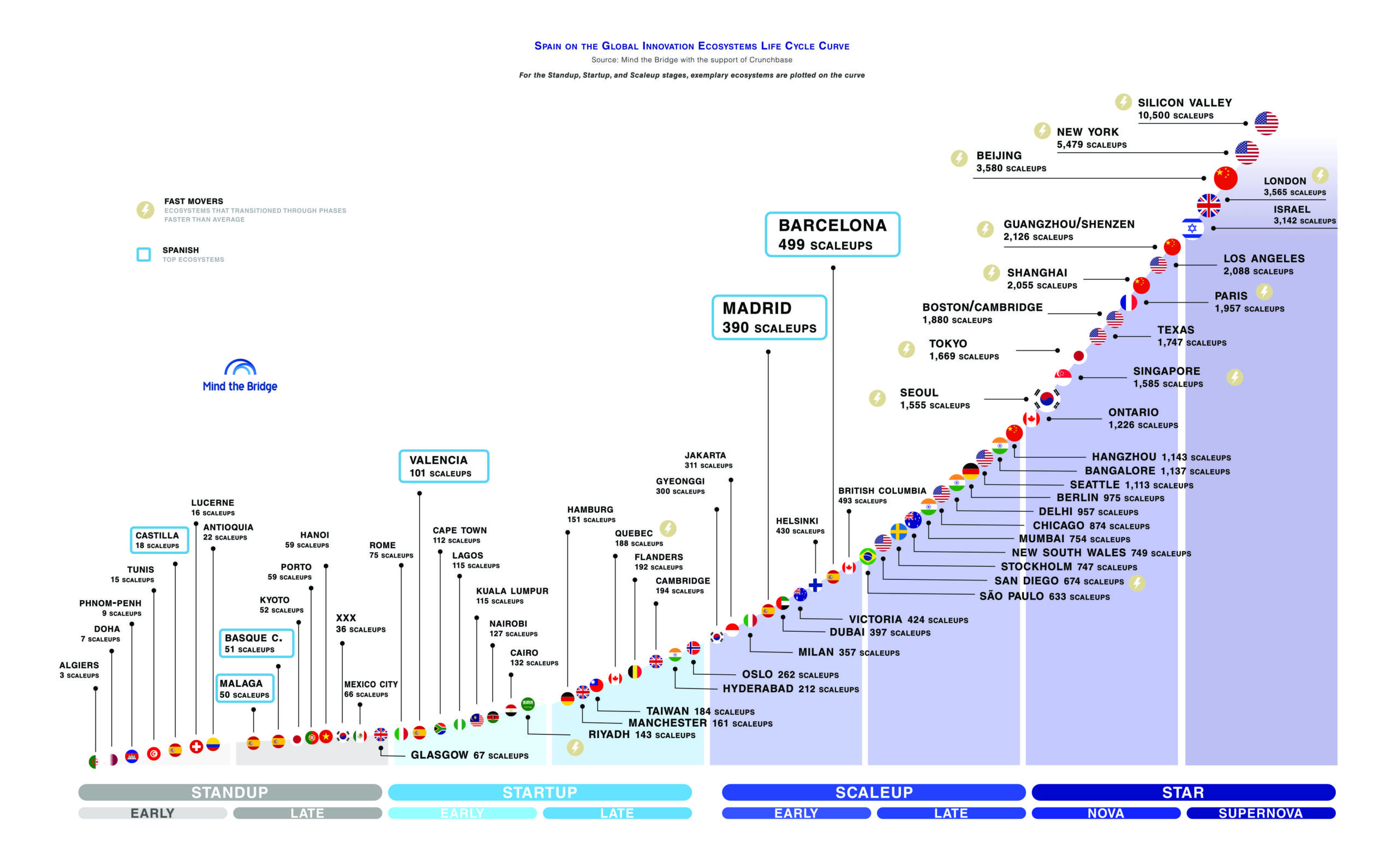By Alberto Onetti
In recent years, Spain’s startup economy has experienced impressive waves of growth — most notably in 2021 and 2022, when it outpaced many European peers.
Even in the turbulence of 2023, with recession winds shaking global markets, Spain emerged as one of the continent’s most resilient innovation ecosystems.
These outcomes are far from accidental.
As detailed in our just-released Tech Scaleup Spain 2025 Report — produced by Mind the Bridge and Crunchbase with the support of Acciona (download here) — the country benefits from strong fundamentals:
- A vibrant startup community, energized by more than 15 world-class tech events each year (especially South Summit and Mobile World Congress), attracting hundreds of thousands of participants.
- A solid investment base of 120-plus active investors (fully and freely accessible through the MTB Ecosystem platform).
- A growing pool of 1,194 scaleups that have collectively raised $22.6 billion in capital, ranking Spain fourth in Europe.
- A deepening maturity, with 42 scalers raising more than $100 million and two super scalers surpassing the $1 billion milestone.

Growth with limits: Is Spain keeping up?
Despite strong figures, the data invites a more critical question: Is Spain growing fast enough to remain globally relevant?

While the country has overtaken comparable peers such as Italy, it is falling behind newer innovation powerhouses including South Korea and Australia.
Ten years ago, the scaleup ecosystems of Spain, Italy, South Korea and Australia were roughly comparable. But today, Korea has doubled Spain’s output (2,127 vs. 1,194 scaleups), and Australia is now almost 1.5x larger (1,512 scaleups).
Clearly, other ecosystems are scaling faster — often thanks to stronger public policies and greater access to capital. South Korea’s Global Unicorn Project, for instance, is an international benchmark for state-led innovation acceleration.
A dual-core model: strength or Achilles’ heel?
Unlike most countries where innovation activity centers on a single urban hub (think: London, Paris or Berlin), Spain operates under a dual-core model — what we call the “scaleup duopole” of Barcelona and Madrid.
Barcelona is home to 42% of Spain’s scaleups and receives 47% of national scaleup funding, while Madrid hosts around one-third of the country’s scaleups and attracts roughly 39% of investment.
This model brings both promise and peril.
On the positive side, this approach avoids overconcentration. Unlike “winner-takes-all” ecosystems that create urban congestion, gentrification and inequality, Spain’s distributed model may offer greater economic balance and social sustainability. It spreads innovation opportunities and avoids “industrial desertification” in tier 2 regions (although, in practice, all cities outside of Valencia still show very limited scaleup concentration).
But there’s a flipside.
Having two strong but separate hubs may dilute critical mass, reducing each city’s ability to compete globally. In fact, using our Innovation Ecosystems Life Cycle Framework, both Madrid (390 scaleups) and Barcelona (with 499) are still stuck in the “Early Scaleup” stage. And at their current pace, neither is expected to transition to the next stage by 2025.
Meanwhile, global peers are moving faster.

Conclusion: it’s time to choose boldly
Spain’s startup economy stands at a crossroads.
Its strengths — community, capital and distributed growth — are undeniable. But its model may no longer be enough. In a world where density, speed and global visibility are key, Spain needs to evolve if it hopes to remain competitive.
Unlocking the next phase of growth will require bold steps: stronger public-private alliances, a clear strategy to invest in frontier technologies, and deeper international connections.
The proposed España Tech Alliance — modeled on France’s La French Tech — could be a promising start. But more needs to happen.
As we often say at Mind the Bridge: In the world of innovation, it’s evolve or be extinct.

Alberto Onetti is chairman of Mind the Bridge and a professor at University of Insubria. He is a serial entrepreneur who has started three startups in his career, the last of which is Funambol, among the five Italian scaleups that have raised the largest amount of capital. He is recognized among the leading international experts in open innovation and has wide experience in setting up and managing open innovation projects — venture clients, venture builders, intrapreneurship, CVCs — with large multinational companies, as well as advising and training on this subject. Onetti has a column on Sifted (Financial Times) and several other tech blogs.
Related reading:
Illustration: Dom Guzman

Stay up to date with recent funding rounds, acquisitions, and more with the
Crunchbase Daily.









